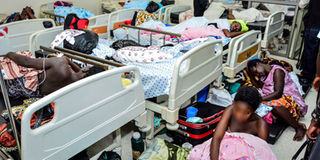Govt to recruit more medics to manage maternal deaths

Medical care. Mothers under postnatal care at Kawempe Referral Hospital on August 23, 2016. PHOTO BY ERIC DOMINIC BUKENYA.
What you need to know:
- 31,565 issue: The number of teenagers who get pregnant in the country on a monthly basis, according to data by the District Health Information System.
Government is in the process of recruiting more health workers to curb high maternal and newborn deaths.
Dr Robert Mutumba, the principal medical officer of the Reproductive Health and Child Health Department at the Health ministry, blamed the deaths on having few health workers.
“…We usually convene meetings to analyse and look at the number of mothers and babies who died the previous week and we try to have a conversation, review those deaths, and analyse the factors that could have led to the death of these mothers,” Dr Mutumba said yesterday on the sidelines of dialogue on Sexual and reproductive health rights in Kampala.
He added: “One of the factors that has consistently come out is the inadequate numbers [of staff at the facilities] especially critical human resources, for example, the midwives, anesthesiologists, obstetricians and newborn carers,” .
He added: “This has to that effect, seen the ministry of health embarking on an exercise of really engaging heavily the Ministry of Finance to have more wages allocated for the recruitment of more health workers and with the focus on those that are more critical.”
When asked about the statistics of mothers and babies who die that could have informed their decision to recruit more medics, Dr Mutumba said they relied on the 2016 demographic report that showed that between 16 and 18 mothers die every day while giving birth.
For the newborn babies, Dr Mutumba said on average, the country loses 200 babies per week, a figure he said is worrying as it is on the higher side.
Dr Mutumba could not readily state how many health workers the ministry is going to recruit but said the human resource department is currently reviewing staffing structures to have more medics recruited.
Speaking at the same dialogue organised by Centre for Health, Human Rights and Development, a civil society organisation, Dr Othiniel Musana, a gynecologist, said data by the District Health Information System, shows that 31,565 teenagers get pregnant monthly.
He said this means that 1,052 teenagers become pregnant daily with 44 of them getting pregnant every hour.




